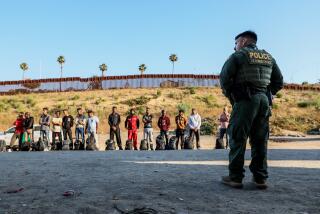Hundreds of migrant youths held at Texas military base
Reporting from San Antonio — A boy caught crossing the southern border illegally found himself here Thursday, in a windowless room in a bleak, beige brick base building, listening to a caseworker explain in Spanish that this will be his temporary home until the courts decide his fate.
The caseworker was one of 102 assigned to the 1,015 youths held at the temporary shelter. The boy, with spiky black hair and a red T-shirt, listened as the counselor, her laptop propped in between them, explained that she would help with his paperwork. The government would attempt to place him with relatives or an approved sponsor while his case made its way through immigration court.
------------
FOR THE RECORD
An earlier version of this post quoted an official saying the shelter’s dorms are not air conditioned. Another official later said the dorms do have air conditioning, though staff turn it down. The dorms also are equipped with fans.
------------
“You have to be patient,” the caseworker said.
This emergency shelter at Lackland Air Force Base was first opened two years ago to cope with an influx of unaccompanied youths crossing the Mexican border, particularly in Texas, many fleeing deteriorating conditions in Central America. It closed after two months because the need waned, but reopened two weeks ago in response to a new surge and is already approaching its capacity of 1,200 youths, ages 12 to 17.
Immigrant advocates say they understand the government is pressed for shelter space, but that they know little about how the facility is run, and fear that youths traumatized before and after their perilous journey will struggle in the massive, institutional setting.
On Thursday, officials from the U.S. Department of Health and Human Services, which runs the shelter through San Antonio nonprofit contractor BCFS Health and Human Services, led reporters on a one-time, 40-minute tour of the facility. They did not allow interviews with youths, caseworkers or other staff.
The spiky-haired boy’s identity and origins, like those of scores of others held there, remained a mystery.
One thing became clear as the tour unfolded: His time here will be regimented.
Before he even arrived, he was detained at another shelter, screened for mental health issues, vaccinated and repeatedly checked for lice and scabies (nearly 60 medical professionals are available, although only one doctor is on site).
Then he was assigned to a dorm. Each has 60 beds, lined up on each side of the room. Each bed comes with a gray metal locker that occupants attempt to personalize with drawings, paper lanterns and flowers.
“Listen God,” one of the signs exhorted in Spanish, “and let this torment end soon.”
The dorms have air conditioning, though staff turn it down because the youths are more accustomed to fans, which are also in use, an official said. On Thursday, staff were assembling more fans for the facility.
The boy was issued the same supplies as his brethren: two bed sheets, two towels, a pillow and cot cover.
Like the rest, the boy would be granted two 10-minute phone calls per week.
He would eat in the dining hall, where staff can serve 1,000 youths in an hour and a half. On Thursday, the menu included macaroni and cheese, chicken fingers, coleslaw, milk and bananas.
A sign on the wall titled “House Rules,” in English and Spanish, promised, “We will do our best to care for you for the short time you are here,” and, “We really do care about you!”
The boy would join others carrying school books labeled “Kindergarten” into the shelter’s windowless classrooms where on Thursday the teacher was reviewing English vocabulary. Youths receive rudimentary English, math and art classes as well as optional religious instruction, officials said.
“Repeat after me,” the teacher said as she paced the room, papered with student drawings of Central American flags. “Small, tall, short. Circle the short one.”
They repeated.
“Write the vocabulary,” she said in Spanish, and they did.
For fun, boys sit on their cots and braid yarn, play board games and cards. Girls sit giggling, cross-legged in a circle on the linoleum floor, which smells of Lysol and sometimes squeaks when they walk too fast in their sneakers and plastic sandals. They have a spartan game room, where they are looking forward to watching some of the World Cup, officials said.
On Thursday, some played basketball outside, surrounded by a cyclone fence and under the watchful gaze of some of the 10 guards assigned to the facility, off-duty police officers and sheriff’s deputies. Beyond the fence, which lines the base’s edge, glowed signs of the land of promise they had crossed a border to reach: Family Dollar, Auto Zone, Sonic and McDonald’s drive-throughs.
About 100 boys sat at picnic tables outside Thursday morning, listening to a BCFS staffer offer encouragement. Some wore plastic rosaries, others friendship bracelets. When it came time to pray, the youths bowed their heads.
“Have patience in this place,” the staffer said. “God is with you.”
More to Read
Sign up for Essential California
The most important California stories and recommendations in your inbox every morning.
You may occasionally receive promotional content from the Los Angeles Times.











